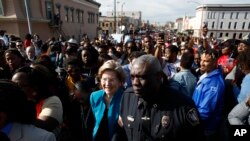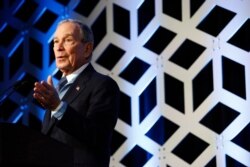Democratic presidential candidates were in Selma, Alabama, Sunday — a place where African Americans once risked their lives simply by demanding the right to vote.
The Democrats were among those marking the 55th anniversary of what's known as Bloody Sunday, where police beat and tear-gassed civil rights marchers as they tried to cross a bridge to walk from Selma to the state capitol in Montgomery.
Fresh off his big win in Saturday's South Carolina primary, which he won with the support of African American voters, former Vice President Joe Biden spoke to worshippers at Selma's Brown Chapel AME Church.
Biden quoted civil right leader Martin Luther King Jr. and former President Barack Obama to talk about what he sees as the country's lack of progress under President Donald Trump.
"We've been dragged backwards and we've lost ground. We've seen all too clearly that if you give hate any breathing room, it comes back," Biden told the congregation.
Former New York Mayor Michael Bloomberg got a much chillier reception from the churchgoers.
Bloomberg is struggling to find solid support among black voters, many of whom are still angry over New York's "stop and frisk" policy, a police practice that targeted young black men when Bloomberg was mayor.
He has apologized for the crime prevention tactic that called for police to stop and search people they suspected of criminal activity, most of whom were black and Latino. A handful of people turned their backs on Bloomberg when he addressed the Selma church.
"Dr. King understood that the right to vote was only the first step in the march to true equality, because true equality means that wealth in this country should have no relation to race or ethnicity," the ex-mayor said.
Other Democrats, including Elizabeth Warren, Pete Buttigieg and Amy Klobuchar, joined the thousands who marched across the Edmund Pettis Bridge Sunday, where they would have been beaten and tear gassed if they had tried to do it March 7, 1965.
The candidates were overshadowed by congressman and civil rights icon John Lewis, who was among those whose attempt to cross the bridge 55 years ago ended with a policeman's club to his skull.
There was doubt whether Lewis would attend. He is battling stage 4 pancreatic cancer. But he said he wanted to be part of the anniversary despite his serious illness and reflect.
"I thought I was going to die on this bridge. But somehow and some way, God almighty helped me here. ... I'm not going to give up, I’m not going to give in. We're going to continue to fight," Lewis said, calling the vote "a nonviolent instrument to redeem the soul of America.
"We must go out and vote like we never ever voted before," he said.
Millions of Americans were sickened and horrified watching television pictures of police beating peaceful marchers in 1965.
King led a second march two days later that ended peacefully. But more than 20,000 civil rights supporters, including hundreds of clergymen and women from around the country, came to Selma for a third march that made it all the way to Montgomery.
The Selma marches was one of the events that led to congressional passage of the 1965 Voting Rights Act.







